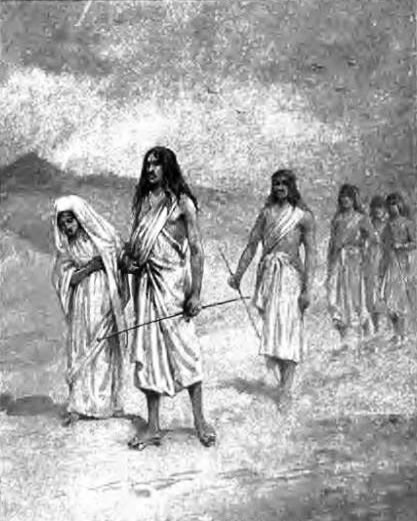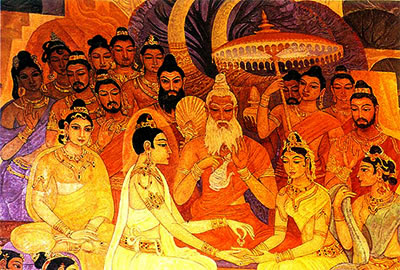Muhurta:
Why is it important?
The following question was asked in a public forum. My answer follows.
Q. “How important is exact determination of auspicious muhurtas for performance of Vedic samskaras?"
A. Your question is like asking a farmer how important is it to plant seeds in the spring as opposed to planting in the dry season or in the winter. You obviously plant seeds at the best time so that you get optimal results.
Similarly, when it comes to planting any action - karma - or kriya, (samskaras are given in sat-kriya-sara dipika, that is, auspicious actions to be performed that have beneficial spiritual effects on a person) to get an optimal effect they should be done during an auspicious time.
As we learn in the 11th chapter of the Gita and in many places in the sastras the Time factor is a form of God (see for example SB 3.10.10, SB 3.26.18, SB 3.29.4 and SB 3.29.38 references below). As both devas and asuras have learned and the sastras teach it is always best to have the Time Factor on your side for the Time factor is all powerful. Hence it would behoove us to choose the best time for doing any important work to help us get a good effect. If something is worth doing then it should be done properly, that is, when all factors including time are favorable.
There is however a tendency in ISKCON, at least among some, to think that we are much more advanced than we actually are (despite a lot of scandalous history mind you) hence we are above all such considerations regarding choosing auspicious time for performing samskaras. This attitude suggests several things: hubris, and a type of arrogance born out of ignorance of Krsna's Vedic culture. By the last statement I mean that a person is ignorant of the culture but is too proud and arrogant to actually learn it but instead assumes themselves to be more advanced and hence not needing it---yes it is a strange mind set. The better ones think that by chanting the Holy Name all is well. This is absolutely and 1008% true providing that they chant without offence or at least with few offences. And, don't forget the Time factor is Krsna Himself, so your chanting had better be very pure to offset the all powerful force of Time. How many of us are chanting at the level of Haridasa Thakura?
Subscribe to our mailing list. And get our intermittent newsletter and updates to this site.
And since the Time factor is Krsna Himself it is a bit arrogant to think that we can scoff at Him and not consider Him important don't you think? A much safer and humbler approach would be to take advantage of the Kalavidya-- science of time -- and deal with Time in an appropriate way - that is, according to His rules. Time is like fire. It can be used to heat your home and cook your meals or it can burn and destroy everything.
Also choosing an auspicious time is an act of free will. Since we have freewill we should use it wisely as opposed to simply doing what is convenient for us, that is, what agrees with our sense gratification.
Convenient: Personally suitable or well-adapted to one's easy action or performance of functions; favorable to one's comfort, easy condition, or the saving of trouble; commodious. Oxford English Dictionary.
I suggest that the hubris, ignorance and arrogance previously mentioned is closely connected with the desire to do what is convenient rather than what is necessary.
We note that because Diti was in a hurry and conceived her children during an inauspicious time her off-spring were demons. She did this despite the warning of her husband.
Hence, I would advise that if at all possible you should choose as auspicious a time as possible especially for the more important of the samskaras, like garbhodana, vidyarambha (first education) upanayanam, etc. Some, like the samskara immediately after birth have to be done then and there so there is no question of choosing a time. The same goes for Antyesti, the funeral rites. But that is not the case with the other samskaras.
Choosing an auspicious time should be done by a well trained and experienced astrologer. Unfortunately in ISKCON (and elsewhere) there are few who can do that. The "astrologers" that are found are mostly studying Jataka - how to read a Natal chart - with varying degrees of success. They are not trained in how to choose a Muhurta-auspicious time, or any other branch of Jyotish such as Prasna or Nimmita (jyotish has 6 main branches: ganita, gola,jataka, prasna, muhurta, and nimmitta).
If, in the event that you can not locate a competent astrologer that you can trust, or if time is short and you must make a decision quickly then the safest course is to do the samskara exactly at noon (local mean time) when the Sun is directly overhead. This will probably not coincide with clock time but should be close enough. This time is known as Abhijit muhurta and also the time that several avataras appeared including Sriman Vamanadeva. This should only be done in an emergency not as a matter of policy. Garbhodhana (conception of a child), however should not be done at this time, for unless the muhurta is exceptionally good in the daytime this samskara should only be done after sunset.
I would be remiss if I did not state that choosing an auspicious time is not a panacea for everything but only one factor. Returning to our farming metaphor, while it is absolutely necessary that seeds are planted at the right time it is not sufficient to produce a good harvest. Other factors are also necessary: sufficient rain, cultivation, fertilization, soil type, etc. So, while choosing an auspicious time is a necessary condition it is not a sufficient condition to ensure success. As Arjuna said in the Sabha Parva of the Mahabharata to Yudhisthira:
Success is determined by three things: concentration of mind, determined effort, and the will of God.
So out of three factors two are dependent on us and one on Krsna. Thus choosing an auspicious time comes under "determined effort" and we then depend on Krsna for the result.
Yours in the service of my eternal master Srila Prabhupada
Shyamasundara Dasa
Sastric references:
sri-bhagavan uvaca
kalo 'smi loka-ksaya-krt pravrddho
lokan samahartum iha pravrttah
rte 'pi tvam na bhavisyanti sarve
ye 'vasthitah pratyanikesu yodhah
TRANSLATION
"The Supreme Personality of Godhead said: Time I am, the great destroyer of the worlds, and I have come here to destroy all people. With the exception of you [the Pandavas], all the soldiers here on both sides will be slain." Bhagavad-gita As It Is 11.32
vidura uvaca
yathattha bahu-rupasya
harer adbhuta-karmanah
kalakhyam laksanam brahman
yatha varnaya nah prabho
TRANSLATION
Vidura inquired from Maitreya: O my lord, O greatly learned sage, kindly describe eternal time, which is another form of the Supreme Lord, the wonderful actor. What are the symptoms of that eternal time? Please describe them to us in detail. Srimad Bhagavatam 3.10.10
antah purusa-rupena
kala-rupena yo bahih
samanvety esa sattvanam
bhagavan atma-mayaya
TRANSLATION
By exhibiting His potencies, the Supreme Personality of Godhead adjusts all these different elements, keeping Himself within as the Supersoul and without as time.
Srimad Bhagavatam 3.26.18
kalasyesvara-rupasya
paresam ca parasya te
svarupam bata kurvanti
yad-dhetoh kusalam janah
TRANSLATION
Please also describe eternal time, which is a representation of Your form and by whose influence people in general engage in the performance of pious activities.
Srimad Bhagavatam 3.29.4
yo 'ntah pravisya bhutani
bhutair atty akhilasrayah
sa visnv-akhyo 'dhiyajno 'sau
kalah kalayatam prabhuh
TRANSLATION
Lord Visnu, the Supreme Personality of Godhead, who is the enjoyer of all sacrifices, is the time factor and the master of all masters. He enters everyone's heart, He is the support of everyone, and He causes every being to be annihilated by another. Srimad Bhagavatam 3.29.38

